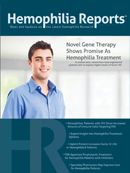Publication
Article
Hemophilia Reports
B-cell-targeted Therapies May Soon Be Used for Multiple Sclerosis
While multiple sclerosis (MS) has traditionally been thought of as being a T-cell mediated disease, an increasing body of evidence suggests that B cells and autoantibodies are involved in the pathology of MS, providing support for the use of treatments directed against B cells.

While multiple sclerosis (MS) has traditionally been thought of as being a T-cellmediated disease, an increasing body of evidence suggests that B cells and autoantibodies are involved in the pathology of MS, providing support for the use of treatments directed against B cells.1 Several B-cell—targeted therapies, including rituximab, ocrelizumab, and ofatumumab, are being evaluated for use in MS.
Rituximab
Rituximab, a monoclonal antibody against a cell-surface antigen expressed on pre-B and B cells, CD20, depletes B cells.3,4 In a double-blind, randomized, multitrial, phase II study, patients with relapsingremitting multiple sclerosis (RRMS) received a treatment course of rituximab (1 g × 2, 2 weeks apart, n = 69) or placebo (n = 35).5 The number of gadoliniumenhancing T1 lesions were quantified by MRI scans at study weeks 12, 16, 20, and 24. Rituximab-treated patients showed a significant reduction in the total number of lesions. Additionally, rituximab-treated patients showed significantly fewer relapses (14.5 % vs 34.3 % at week 24; 20.3 % vs 40.0 % at week 48).
Ocrelizumab
Ocrelizumab, also a monoclonal antibody against CD20, is selective for CD20+ B cells.7 In a phase II, multicenter, randomized, double-blind study, patients with RRMS received placebo (n = 54), 600 mg of ocrelizumab infused every 24 weeks (n = 55), 2000 mg of ocrelizumab infused every 24 weeks (n = 55), or 30 μg of interferon beta-1a administered intramuscularly each week (n = 54).8 At 24 weeks, patients receiving low and high doses of ocrelizumab showed fewer gadolinium-enhancing lesions than patients receiving placebo (89% and 96%, respectively). Annual relapse rate was 80% lower in patients administered the low dose and 73% lower in patients administered the high dose.9
Ofatumumab
Ofatumumab is a human recombinant anti-CD20 antibody that acts differently than rituximab and ocrelizumab.7,10 A phase II, multicenter, doubleblind trial was conducted in 38 patients with RRMS.11 For each 24-week treatment cycle, patients received a total dose of either 100 mg (n = 12), 300 mg (n = 16), or 700 mg (n = 11) of ofatumumab in 2 infusions administered 2 weeks apart. Over 48 weeks, each patient received one cycle of medication and one cycle of placebo. Ofatumumab treatment suppressed new brain MRI lesion activity. Significantly fewer gadolinium-enhancing lesions formed during treatment cycles than during placebo cycles (mean: 0.04 vs 9.69; P <.001).11
A recent study of 231 patients presented at the American Academy of Neurology’s 66th Annual Meeting in Philadelphia, PA, in 2014, showed that patients with RRMS who were treated with one of several low doses of ofatumumab showed suppression of lesion activity and reduced B cells compared with placebo.2
References:
1. Duddy M, Bar-Or A. B-cells in multiple sclerosis. Int MS J. 2006;13(3):84-90.
2. Study Suggests Targeting B Cells May Help with MS. Press Release: April 24, 2014. Accessed May 27, 2014.
3. Stashenko P, Nadler LM, Hardy R, Schlossman SF. Characterization of a human B lymphocyte-specific antigen. J Immunol. 1980;125(4):1678-1685.
4. Clynes RA, Towers TL, Presta LG, Ravetch JV. Inhibitory Fc receptors modulate in vivo cytotoxicity against tumor targets. Nat Med. 2000;6(4):443-446.
5. Hauser SL, Waubant E, Arnold DL, et al. B-cell depletion with rituximab in relapsing-remitting multiple sclerosis. N Engl J Med. 2008;358(7):676-688.
6. Rituxan Phase II Data in Patients with Relapsing-Remitting Multiple Sclerosis. Presented at the AAN Annual Conference. May 1, 2007.
7. Lulu S, Waubant E. Humoral-targeted immunotherapies in multiple sclerosis. Neurotherapeutics. 2013;10(1):34-43.
8. Kappos L, Li D, Calabresi PA, et al. Ocrelizumab in relapsing- remitting multiple sclerosis: a phase 2, randomised, placebo- controlled, multicentre trial. Lancet. 2011;378(9805):1779- 1787.
9. Phase II Study with Ocrelizumab Shows Significant Reduction in Disease Activity for Multiple Sclerosis Patients. Press Release: October 15, 2010. Accessed May 27, 2014.
10. Cheson BD. Ofatumumab, a novel anti-CD20 monoclonal antibody for the treatment of B-cell malignancies. J Clin Oncol. 2010;28(21):3525-3530.
11. Sorensen PS, Lisby S, Grove R, et al. Safety and efficacy of ofatumumab in relapsing-remitting multiple sclerosis: a phase 2 study. Neurology. 2014;82(7):573-581.





